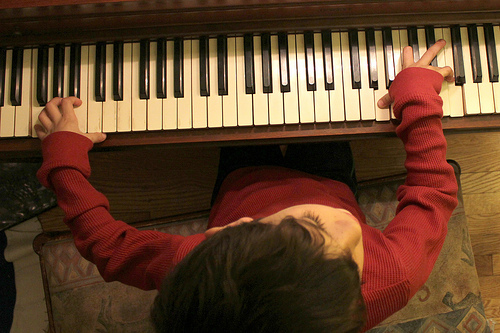People are rewarded in public for what they practice for years in private. – Tony Robbins
What does that mean?
This is another straight forward observation of human life. When people get rewarded in public, it is rarely for something they did the very first time.
Instead, people are rewarded for things they do well, and that usually comes to them in one very specific way. Practice. Usually a lot of practice. Years and years, in most cases.
You don’t play Carnegie Hall after a month or two on your instrument. If you play it at all, you will have practiced for years and years and years.
And remember, rewards come in many sizes, from the congratulations of someone prominent in your field, to an awards ceremony carried on National TV. But it all starts with practice.
Why is practice important?
There isn’t any other way to become good. And it is how the good get better. Michael Jordan didn’t make the Varsity team as a Sophomore in High School, he worked all the harder. Fire is how gold is refined. Friction is how gems are polished. Practice is how a person is improved.
Not all practice is the same. At first, it may not matter how good your form is, but as you become better, sloppy practice starts being as much a hindrance as a helper. As you get better, your practice has to get better as well, or you won’t get any better than ‘sloppy.’
If you’ve ever tried to sand or polish something, you know you start with really rough grit, and then move to smaller grit, and eventually a paste. Similarly when refining metal, you usually do it in stages, each yielding a better product. To get better, your practice has to get better as well.
It is said that practice does not make perfect, but that perfect practice will get you close. If you practice sloppy, you will get really good at sloppy. If you want to get rewarded for what you do, why get good at sloppy, when it takes no more effort to be straight-up good?
Where can I apply this in my life?
Not everyone is in it for the recognition or a public reward. Some even turn the opportunity down. But does that mean we should avoid practicing and getting better at something if we aren’t a glory seeker or publicity hound? I don’t think so. What about you?
Do you feel it takes a certain amount of ego or desire for public recognition to make it worth bettering yourself? I don’t believe so. I also think that if you believe it does, you might want to reconsider that belief. There are plenty of unsung heroes who do good, even great, things.
There are plenty of people who are great at what they do, even though no one ever gives them awards or public rewards. That doesn’t stop them from being the best person they can be, and striving to be the best at what they love to do. Could you be one of them?
Think about the things you do, and do well. Do you only give your best when there is a public reward on the line? Or do you do your best because that is what you do, and what you have trained or practiced to do? Most people I know do their best because of personal pride.
The point of the preceding paragraphs was to point out some of the reasons why we practice. It tends to be irrespective of whether we are seeking public attention or reward for our effort or skills. What the seeking of public recognition does do is provide motivation.
Those who are driven to be recognized tend to use that drive for motivation, and it works. Michael Jordan wanted to be on the Varsity team so badly that he worked harder to be recognized as worthy of being on the team, even though he was stuck on the JV squad.
Was he looking for the adoration of fans, or just for the approval of the coach? Who knows. But that motivation was what helped him move from someone with great natural talents and a modest amount of polish, to a well polished gem of a basket ball player, with a lot more polishing to come.
What do you do, and why do you strive to get better at it? Is it personal pride? Do you do it with friends, and want to be ‘the best’ at least every once in a while? Is it a way to improve yourself or better your career?
We all have different reasons. But the more emotion we have in that reason, the greater the motivation, the harder and more often we will practice.
What are you going to practice, and more importantly, why will you do it?
From: Twitter, @tonyrobbins
confirmed at : http://beplus.org/2012/02/01/quote-about-rewards-by-anthony-robbins/
Photo by woodleywonderworks
Related articles
For some odd reason, my ‘related articles’ app appears to be face down in the mud. I hope to have something that works by tomorrow.








Pingback: The skill of self confidence | My Life As An Open Book